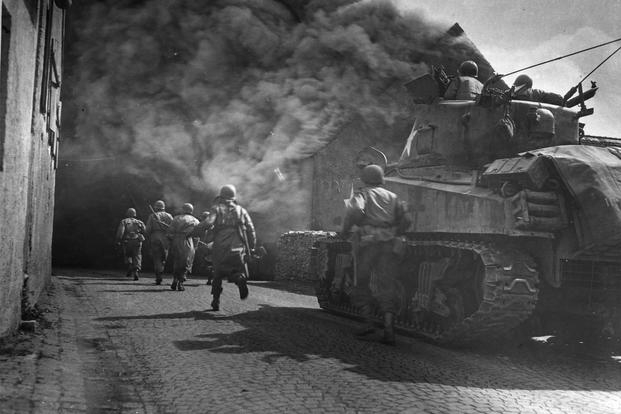Hello, my name is Sherman Baxter. I was born Sept. 6, 1919, at Dover, New Hampshire. I entered the service Jan. 12, 1942. I was mustered out Sept. 10, 1945. I went to Camp Croft, S.C., for basic training. Then I went to Ft. Benning, Ga., where I was assigned to D company, 66th Armored regiment, 2nd Army division.
The division was there only a few months and went on maneuvers and ended up at Ft. Bragg, N.C. We didn't go back to Ft. Benning because the 10th Armored division was a new division being formed and they took over. From Ft. Bragg, we went to Ft. Dix, N.J.
On December of 1942, we shipped out and went to Africa. In June 1943, we were involved in the invasion of Sicily. We took the southern half, and we took Palermo in 10 days as I recall. And the whole island was secured in 30 days. At that time, I was a tank driver with the rank of corporal.
In November of 1943, we shipped out again. This time, we landed in Scotland and traveled to S. England. We were housed in Tidworth Barracks until the invasion of Normandy. While in England, we had more training. We went to Scotland to use firing ranges for tanks. In England, we had a driving range to instruct men on driving tanks. There were many replacements for training, because we sent several tank crews to Italy while we were in Sicily. The first Armored division took heavy losses and needed these men.
While in England, I went to chemical warfare school and taught classes with the men of my company, teaching them what I had learned. We had good instruction in the use of weapons, also what weapons the enemy had and also what vehicles and planes and so forth we could expect to encounter. The German Army was well-trained on all types of booby traps, land mines and all sorts of trickeries. So much time was spent on that sort of thing.
We also learned what we had learned from combat experience we went through. The last few days in England, we spent time servicing tanks, waterproofing engine compartments, loading fuel, ammunition and checking anything that might cause trouble later.
We had practice runs at night, driving blackout, loading tanks on LST's and anchoring them. Downtime was important; other ships had to be loaded as soon as we moved out. We loaded the night of June 5, 1944, and moved into the channel, with other ships before daylight on June 6. We were quite near the coast of France. We went ashore on Omaha Beach in daylight on the morning of June 6.
During our stay on LST's that night, there were many men that were so nervous, it was hard to believe that they were the same men that we had known for months and some for years. Some were quiet; others were more talkative. I was concerned with the men in my platoon, as they were the ones that I'd be close to in combat. I'd talk to the men that wanted to talk and pray with those who wanted to pray. It was hard to not show too much worry of what we had to do. I tried to give courage to all, especially the men who had not seen combat.
It was still dark the morning of June 6. The advance forces had landed, bright searchlights lit up the whole shore and the beach, but our men knocked them out in a short time. All along the waterfront, there were vehicles and equipment that had been knocked out by enemy fire.
On the beach, wounded men and a group of prisoners were being guarded by U.S. troops. The LST's carried 33 tanks. I was in the third tank off the ship as we mounted up preparation to move off the ship. Sergeant Martin, my platoon sergeant, yelled to me, "Let's go ashore and keep them running. I yelled, "I'll be waiting for you in Berlin." We often joked about who would be the first one in Berlin.
Our division was the first occupation troops in the American sector, but we never decided which one of us was there first. When we got on land, we went directly to a wooded area, not far from the beach and waited for our company to assemble. It gave us a little cleared space in the landing area. It took more time than planned. We didn't engage the enemy because the beachhead was only three miles deep and we had fewer men from other units than expected. The original plan was to be in 12 miles.
There was unusually rough water and it delayed our unloading for several days so we couldn't push on for lack of supplies and equipment. I was wounded in August of 1944, by a bazooka. It hit my tank at night while we were pushing on. I returned to my outfit two months later to find I had been promoted to sergeant. Only a short time later, I was promoted to staff sergeant, which rank I held until I was mustered out.
I lost three tanks during the whole time, but only one man was killed. I'm proud to say that I'll always be proud of my division. We saw lots of combat and made a good name for itself. I must add, much credit should go to Gen. Patton, who made the 2nd Armored an unbeatable force. He was a division commander when I joined them.
I had hoped no one would ever have to experience what we had to go through, but it seems that the world still has places with so much fighting.
Want to Know More About the Military?
Be sure to get the latest news about the U.S. military, as well as critical info about how to join and all the benefits of service. Subscribe to Military.com and receive customized updates delivered straight to your inbox.














